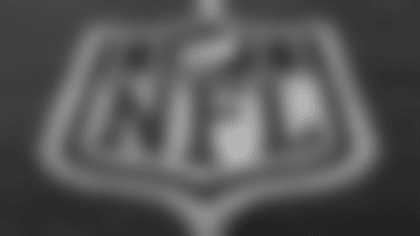What was your best sport growing up? For some people it might not have been football.
"For me it was football. I started off young. I played fifth-grade football. When you played in the fifth-grade and you were one of the biggest kids in class, they didn't let you carry the ball. They put a big sticker on your helmet and said, 'You're blocking.' We lived in a neighborhood where the kids played all the sports, so we didn't have to join a recreation league. We always had enough guys to fill teams, which was neat. You can emulate the games you saw on TV and almost do it in an organized setting because everyone was athletic. It's always been football for the most part for me."
What grade level was your first true organized team?
"Seventh grade was the first time I played in an organized setting. It was fun and different. It was not as exciting as you'd think it would be because you're running the ball most of the time. It wasn't anything spectacular. I was still one of the biggest, so I was still one of the linemen. I liked to play defense more than offense. In college, I was an offensive lineman and I loved it. When you're younger, you always wanted to play one of the more fun positions where you're catching the ball or at least standing up on defense. At least I did that when I was younger. Other than that, everything was in a three-point stance. I guarantee if you asked most of our linemen, I bet most of them had that sticker on their helmet that said, 'You can't touch the ball until you're a certain age or height.' "
Sometimes offensive linemen can be the most interesting guys to talk to, aren't they?
"I definitely agree. They're overall more laid back and approachable. I like our offensive line here a lot. They don't take things personally. You don't have to worry about sensitivity. When you play O-line, you have to really be accustomed to hard coaching, traditionally speaking. I think that's almost the case everywhere. I think O-line coaches generally are a little harder on guys. I think those types of players kind of embrace everybody. It's kind of like the Ellis Island of positions, 'Come all. Everybody, come hang out with the linemen. We'll take them in.' They have to be in unison as a group. If those guys aren't clicking within their own unit, it's tough and a team likely won't succeed."
Who was the first true football influence you ever had?
"My coach, Russ Jakes at Strongsville High School, was a big influence on me. When he first came to the school, everyone knew about his college background. He had coached at Wisconsin with Barry Alvarez and at West Virginia with Don Nehlen. We were excited about having a coach that was seasoned. It turned out to be a good situation for us. I thought it was the first time I started to understand the X's and O's of the game. Some of his staff coached in college as well, and they taught us and we started to know the finer technique points, 'Why you're stepping this way,' which was neat. It came at a good point in my development."
Did someone with his credentials maybe open your eyes a little more than if you had a coach who didn't have that experience?
"Absolutely. When it opens your eyes to different possibilities and helps you see something in a different light, you start to be intrigued and ask questions on how it applied to you. After high school, I had thought of coaching or teaching at the high school level, so his influence helped me. We email still pretty often. He's the assistant athletic director at the school now. He's pretty busy all the time, and we keep in touch. Football in Ohio is a serious deal. It's year-round, to a degree. "
Talk about yourself as a player. How would you characterize yourself?
"In high school and college I was similar. Off the field, I was very laid back and easy to get along with but during practice and games, I was a different guy. When the helmet came on, it was 'on.' It was important for me to establish myself early, particularly in game situations. That sets the tempo for the rest of the game. If you fire off the ball and play with great technique and pad level, try to do your job as far as knocking the guy off the ball as far back as possible until the whistle blows, maybe they'll understand, 'This guy is coming after me. Either I have to be ready, or I have to quit or get replaced.' My goal in college was to make sure there was more than one guy across from me. I wanted the guy across from me to get replaced every time. I played hard, but within the rules."
Where did you get your competitive nature?
"My family can be very intense and focused. They're career-oriented people. My parents, Joseph and Salwa, still work to this day. My dad is retired, but he goes in and oversees the business, a restaurant in Cleveland, but my brother runs it now. My mom goes in at least four days a week to prep the food. She takes it seriously. It's her baby. It's hard for her to let it go."
Why did you choose the college you chose?
"When I was a senior in high school some friends and I visited schools, but Baldwin-Wallace had one of the best quarterbacks. They were playing Mount Union in the fall of 1994 and the atmosphere in the stadium was really neat. It was not far from home. My parents worked a lot and it would have been hard for them to see me if I went away. I had some offers, but it made sense to go to B-W. There were about 10,000 people there that day, and to see the crowd and the excitement was special. The setting of the stadium is good because it's in the middle of the community. The streets are packed and everybody is into the game. John Koz was the quarterback at B-W and Jim Ballard was the quarterback at Mount Union, and I think Sports Illustrated featured them once on its cover. That was really the beginning for Mount Union when they started winning, but B-W was better before then. In Ohio, the games are games, not events. The fans really want to support their teams. The fans are intelligent and it's a generational support that they have. From what I've seen in Indianapolis, it's like that here, too. The football culture here is getting as rich as it has been in Ohio. That tradition helped keep me at home."
What was your best collegiate experience?
"I think graduation was really neat. I had my entire family there. That sticks out the most. I met a lot of people and coaches along the way. My coaches made introductions for me when visitors came by because they knew I was interested in coaching. I do think graduating was the best moment."
When did you first think about a career in football after your playing days?
"It started in my sophomore year. I was a history major and you needed a certain number of credits of an internship. The one I chose was a historical museum on Korea who was run by Eloise Tressel, whose son, Jim, is famous. I got to see how a museum was run, and I learned a lot about the skills involved in the operation. Some of the skills I use today in this job – researching and cataloguing. That's how I go about finding players from college film to this day. It's really carried over well, and the thought process she used in running the museum was neat. There was so much history about the Cleveland Browns and B-W football and her sons, a lot about Jim Brown and Ernie Davis, a lot of pictures. She put me in charge of organizing artifacts and displays. She would talk about being the wife of a coach, and I found it interesting. She also introduced me to a ton of people like Joe Paterno. She knew a lot of people and all she exposed me to professionally had a lasting impact. I knew I was going to have a career in football."
What is your favorite quote on football, leadership, etc. that has shaped your career the most? Explain how/why/when you found it and how you have applied it.
"It sounds like a silly quote, but it makes sense to me. Sometimes when things don't go the way you want, this quote pops in my mind, 'They can't eat ya.' What it means to me is no matter how difficult a situation, it's not like someone will physically eat you, so press on and keep coaching your guys up like you know how to do. Have a reckless abandon to making sure your guys are prepared and know what to expect and not matter what happens, leave it all on the field. A pretty sharp guy used to say it to me when things didn't go as well as I wanted. He will remain nameless."














